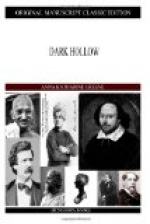She thought of the letter which had been passed up to him in court, and surveyed him with an astonishment she made no effort to conceal. Never had she felt at a greater disadvantage with him. Never had she understood him less. Was this attempt at unconcern, so pitiably transparent to her, made in an endeavour to probe her mind or to deceive his own? In her anxiety to determine, she hesitatingly remarked:
“Not the man who writes those anonymous letters?”
“Letters?” Involuntarily his hand flew to one of his inner pockets.
“Yes, you have found them, have you not, lying about the grounds?”
“No.” He looked startled. “Explain yourself,” said he. “What letters? Not such as—” Again his hand went to his pocket, but shrunk hastily back as she pulled out a crumpled bit of paper and began to smooth it out for his perusal.
“What have you there?” he cried.
“Such a letter as I speak of, Judge Ostrander. I picked it up from the walk a day or so ago. Perhaps you have come upon the like?”
“No; why should I?”
He had started back, but his eye falling involuntarily upon the words she had spread out before him, he rapidly read them, and aghast at their import, glanced from the paper to her face and back again, crying:
“He means Oliver! We have an enemy, Mrs. Scoville, an enemy! Do you know”—here he leaned forward, and plunged his eye, now burning with many passions, into hers—“who this enemy is?”
“Yes.” Softly as the word came, it seemed to infuriate him. Seizing her by the arm, he was about to launch against her the whole weight of his aroused nature, when she said simply: “He is a common bill-poster. I took pains to find this out. I was as interested as you could be to discover the author of such an outrage.”
“A bill-poster?”
“Yes, Judge Ostrander.”
“What is his name?”
“I do not know. I only know that he is resolved upon making you trouble. It was he who incited this riot. He did it by circulating anonymous missives and by—forgive me for telling you this— affixing scrawls of the same ambiguous character on fences and on walls, and even on—on—” (Here terror tied her tongue, for his hand had closed about her arm in a forceful grip, and the fire in the eye holding hers was a consuming one) “the rails—of—of bridges.”
“Ah!”
The cry was involuntary, but not so the steady settling of the lips which followed it and the determined poise of his body as he waited for her next word.
“Miss Weeks, the little lady opposite, saw the latter and tore it off. But the mischief had already spread. Oh, strike me! Send me from your house!”
He gave no token of hearing her.
“Why is this man my enemy?” he asked. “I do not know any such person as you describe.”
“Nor I,” she answered more quietly.
“A bill-poster! Well, he has done his worst. I shall think no more about him.” And the burning eye grew mild and the working lip calm again, with a determination too devoid of sarcasm to be false.




